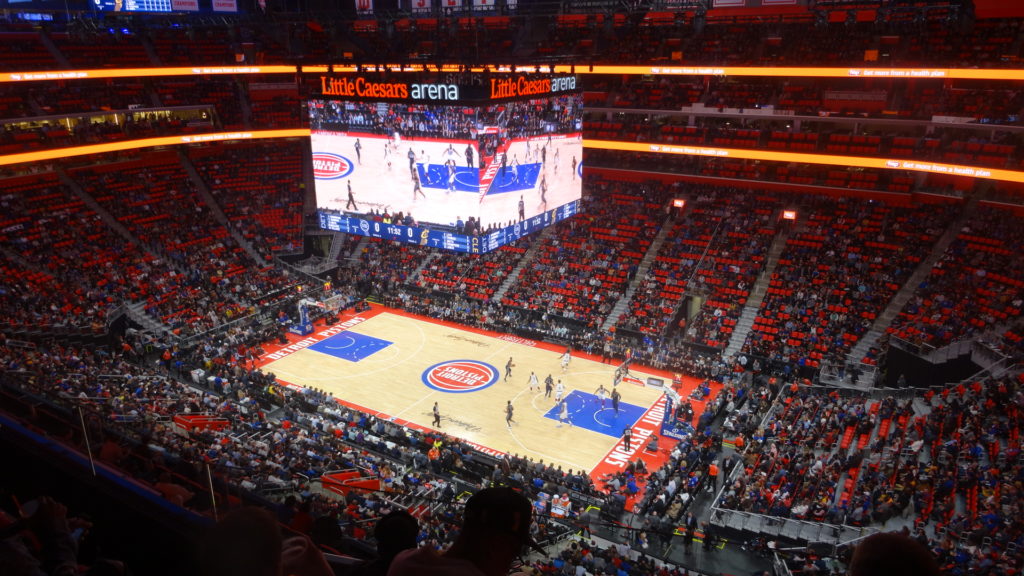March Madness brings out all that is compelling about college basketball. There are the establishment powerhouses from the big American cities. There are the small-town underdogs who make moments that last a lifetime. And there’s always at least one freshman sensations.
And we’re just talking about the arenas.
The First Four begins this week at its traditional home, Dayton’s UD Arena. Then, over the next three weeks, 13 different arenas will become part of the story that is the 2018 NCAA Men’s Basketball Tournament, culminating in San Antonio on April 2. Here is a look at the stages for all the stories as 64 reduces to 1.
EARLY ROUNDS – MARCH 15-18
PITTSBURGH – PPG PAINTS ARENA
You know an arena has the chops to be a quality basketball site in a football, hockey and baseball town when the guy who scores the first points in the building’s history goes on to play in the NBA – in the same state!
T.J. McConnell, once of Duquesne University, now of the Philadelphia 76ers, is the answer to that trivia question. And Duquesne is the host program for this weekend’s tournament games at PPG Paints Arena. This will be the third time the arena has hosted early-round NCAA Tournament games, following the every-three-year pattern that began in 2012, the second year of the building’s existence. PPG is already slated to host early-round games in the 2022 NCAA Tournament.
The primary home of the NHL’s Pittsburgh Penguins, PPG holds 19,100 for basketball games, and would be the home for an NBA franchise, should the league consider bringing basketball back to the Steel City for the first time since an ABA team played at the old Civic Arena in the 1970s.
WICHITA – INTRUST BANK ARENA
Intrust Bank Arena makes its men’s NCAA Tournament debut in 2018 and is already tabbed to host early-round games in 2021. The arena hosted the women’s NCAA Tournament first- and second-round games in 2011.
Intrust Bank Arena opened in 2007 and is the primary home of hockey’s Wichita Thunder (ECHL). The Wichita State Shockers use the arena, which holds just over 15,000 for basketball, as an alternate site for select games, including a December, 2017 matchup against Oklahoma.
DALLAS – AMERICAN AIRLINES CENTER
There was a time, early in its existence, when the American Airlines Center was a common site for NCAA Tournament games, hosting the first- and second-round action in its inaugural season of 2001-02 and again in 2006. The primary home of the NBA Dallas Mavericks and NHL Dallas Stars, the arena was also the home of the Big 12 Conference tournament in 2003, ’04 and ’06.
And then, the NCAA Tournament bid farewell to Big D – games in Texas over the next decade would be played almost exclusively in Houston (NRG Stadium), San Antonio (Alamodome) and nearby Arlington (AT&T Stadium). But the NCAA Tournament is back at the 19,000-seat American Airlines Arena and will host games again in 2021.
BOISE – TACO BELL ARENA
If you had Boise as the most-often used site for NCAA Tournament early-round games among the eight being deployed this weekend … you must be from Boise. And yet, it’s true, Taco Bell Arena will be hosting early-round action for the ninth time since 1983, and the arena hits double-digits in 2021.
Ironically, this popular NCAA destination – originally called the BSU Pavilion upon opening in 1982 — is one of the smallest arenas in use for the Tournament, seating just 12,644 for basketball games. It was the stage for an iconic NCAA Tournament moment in 1995, when UCLA’s Tyus Edney went coast-to-coast and scored at the buzzer to beat Missouri en route to a Bruins national championship.
CHARLOTTE – SPECTRUM CENTER
For six months in late 2016 and early 2017, the Spectrum Center was entangled in a controversy. Because of the passing of the state’s House Bill 2 that had removed anti-discrimination protections for the LGBTQ community, the NBA and NCAA pulled major events from the state of North Carolina, which led to the 2017 NBA All-Star Game being moved out of the Spectrum Center and threatened to cause this weekend’s NCAA Tournament games to also be relocated out of Charlotte.
But with the bill’s repeal in March 2017, the NCAA allowed the Spectrum Center to retain this weekend’s games, making it the fourth such appearance of the NCAA Tournament (2008, ‘11, ’15) at the home of the Charlotte Hornets.
The Spectrum Center, which opened in 2005 and is slated to host the ACC Tournament next season, is the only arena among the eight early-round sites to also host a regional final, in 2008. North Carolina, as it had in 1998 in the regional final against UConn in Greensboro, used its home-away-from-home-court advantage to beat Louisville and advance to the Final Four.
DETROIT – LITTLE CAESARS ARENA
The freshman among the eight early-round sites, Little Caesars Arena (shown above) opened in September and is the home arena for both the Pistons and Red Wings. Seating 20,500 for basketball, this season marks the first time the NCAA Tournament has played games inside city limits since the 2009 Final Four was held at Ford Field.
NASHVILLE – BRIDGESTONE ARENA
Like Boise, Nashville does not come quickly to mind as a basketball hotbed. Bridgestone Arena’s primary tenant is the Predators of the NHL. But like Boise, Nashville has hosted quite a few early-round NCAA Tournament weekends, as this will be Bridgestone’s fifth time hosting since 2000.
And while, at first blush, one might not associate Nashville with basketball, Bridgestone Arena does, in fact, have a rich college basketball history. The SEC has held its tournament there seven times since 2001 and will have six of the next seven starting in 2019. The NCAA Women’s Final Four came to Nashville in 2014.
SAN DIEGO – VIEJAS ARENA
Another non-traditional basketball city reveals it has an NCAA Tournament legacy. San Diego will host early-round games at San Diego State’s Viejas Arena for the fourth time since 2001. Viejas Arena, which opened in 1997 and holds 12,500 for basketball, joins Taco Bell Arena in Boise as the only two on-campus arenas in use during the 2018 NCAA Tournament.
REGIONALS – MARCH 22-25
LOS ANGELES – STAPLES CENTER
From the moment it opened, Staples Center became an iconic basketball site, with Kobe Bryant and Shaquille O’Neal bringing the Lakers an NBA title in its first year of existence in 1999-00. The arena, which holds 19,000 for basketball, was a staple (pardon the pun) for Pac-10 (later Pac-12) basketball, hosting its conference tournament from 2002-12. And yet, most likely because of its triple-hosting of the Lakers, Clippers and NHL Kings, and the scheduling nightmares it created with the Pac-12 Tournament also carving out space, the NCAA Tournament did not grace its halls until 2013 – the year the Pac-12 Tournament moved to Nevada.
That conflict removed, the Staples Center will host a regional for the third time this year (2013, ’15) and will host again in 2020. Only its relative small seating capacity – compared to massive domed stadiums elsewhere – prevents this iconic basketball stage from hosting a Final Four.
ATLANTA – PHILIPS ARENA
Finally, the home of the NBA’s Hawks gets its One Shining Moment. Opened in 1999 as the successor to the Omni, which was a perennial host of early-round and regional NCAA Tournament games in the 1980s and early 1990s, Philips Arena has never hosted a Division I NCAA Tournament game. During its two decades of existence, Phillips took a backseat to the crown jewel of Atlanta venues, the George Dome, which hosted numerous Super Bowls and NCAA Tournament regionals and Final Fours from over its history.
But with the arrival of Mercedes-Benz Stadium and the demolition of the Georgia Dome last year, the door finally has opened for Philips Arena to host a regional next weekend. But it’s a one-and-done. Mercedes-Benz Stadium gets the 2020 Final Four.
BOSTON — TD GARDEN
Facts are facts. Boston is not a college basketball town. Sorry, BC Eagles, it’s true. The Celtics? Sure, they are beloved. But that’s the NBA. Nevertheless, from time to time, the NCAA flirts with Boston. When TD Garden replaced the iconic, yet dilapidated original Boston Garden in 1995, the NCAA threw the city a bone with early-round games in 1999 and 2003. Then the women held its Final Four at TD Garden in 2006, and that seemed to open the doors to Boston hosting regionals on the men’s side. The first came in 2009, then again in 2012. This year, if they can find the arena buried under three vicious snow storms in the past two weeks, they’ll try it again.
OMAHA – CENTURYLINK CENTER OMAHA
What, they’re going to play outdoor basketball in the outfield at TD Ameritrade Park? No, no. Omaha can handle more than one championship sport. In fact, Omaha has been a frequent NCAA basketball tournament site over the past decade, hosting early-round games in 2008, ’12 and ’15. This year, CenturyLink Center, which opened in 2003 and is probably best known as the site of U.S. Olympic swimming trials for the past three Summer Games, gets its first shot at an NCAA Tournament regional. Just don’t call it a Super Regional.
FINAL FOUR MARCH 31-APRIL 2
SAN ANTONIO — ALAMODOME
With a capacity of just under 40,000 for basketball, the Alamodome is an ideal site for the NCAA men’s and women’s Final Four. A neutral city with a rich history, San Antonio has hosted three previous men’s Final Fours (1998, 2004, 2008) and two for the women (2002, ’10). The most recent men’s Final Four in San Antonio was won by Kansas in overtime after Mario Chalmers’ dramatic, game-tying three-pointer late in regulation. It should be noted that the UConn Huskies own the Alamodome, winning the men’s title in 2004 and both women’s championships. But UConn is not in the field this year, so someone else gets a chance to win.
This article originally appeared in the weekly Arena Digest newsletter. Are you a subscriber? Click here to sign up for the free weekly newsletter


